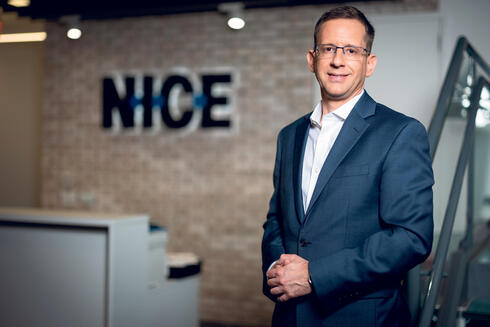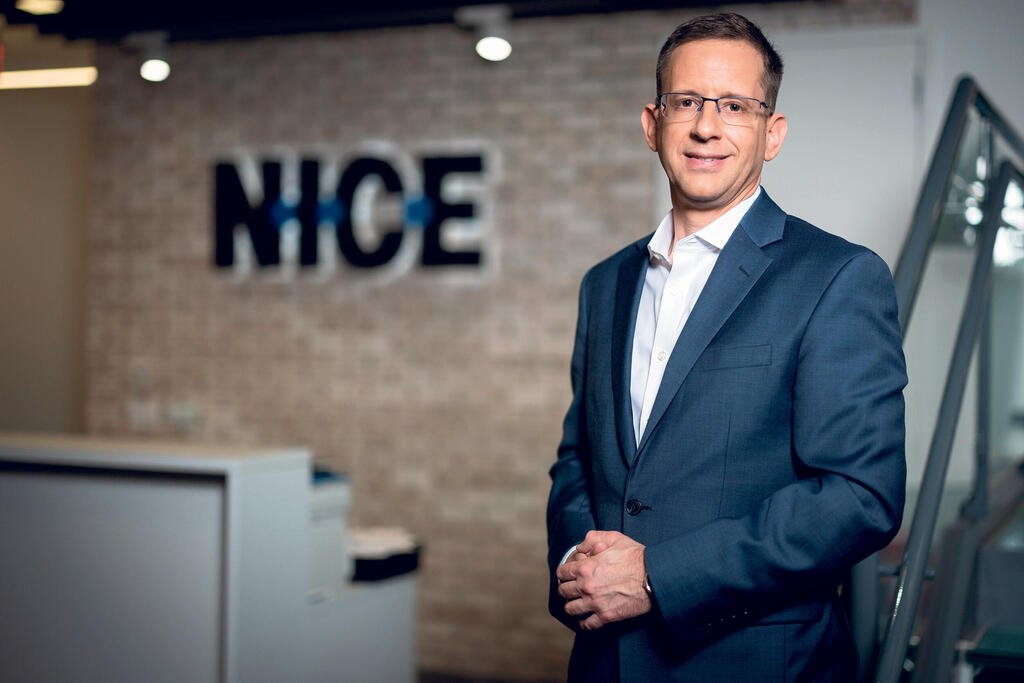
Why did NICE shares drop 13% after the CEO announced his retirement?
The main concern of NICE investors is that Eilam is retiring at its peak. GenAI is expected to have critical consequences specifically for the world of marketing, sales, and customer relationship management, presenting a formidable challenge for the next CEO
"The cemeteries are full of irreplaceable people," the saying goes, but when NICE's stock plunges 13% following the CEO's retirement announcement, it gives one pause. Barak Eilam surprised investors on Thursday with the unexpected announcement of his departure from the enterprise software company. Eilam, 49, completes 10 years as CEO of NICE, having spent more than half his life with the company in total after joining immediately upon his release from Unit 8200, where he served as an officer.
NICE is one of the oldest high-tech companies in Israel, founded in 1986 by retirees from Unit 8200. Eilam took over its management before he turned 40, and in the last decade has turned it into one of the fastest-growing and largest client management software companies in the world. Along the way, he led non-trivial moves, which raised eyebrows at the time but turned out to be correct in retrospect.
The disappointment and fear of the investors are clear: Eilam received a company with revenues of approximately $900 million, trading at a value of $2.5 billion, and within a decade tripled its sales, quadrupled its profit, and turned it into Israel’s most valuable company in 2020, if only for a short time. On Thursday, NICE traded at around $14.5 billion, and the announcement of his departure shaved about $2 billion from its value. In light of this, the generous compensation Eilam received over the years also pales in comparison, making him a very rich man: in 2023 alone, he received compensation worth $24.5 million, and over the decade his cumulative compensation was about $125 million.
"This is not an easy decision for me, but after 25 years with NICE, I believe it is the right time for me to retire. After 10 years as CEO, the torch should be passed to someone else. NICE has been my home for more than half my life, and I will continue to be here to ensure a smooth transition. There is no good time for this, but I decided to do it now. Right now, I am not focusing on the next thing I will do, and what is important to me is to carry out the plan for 2024 and find a replacement. I'm 49 years old and really not good at golf, so I'll have to find something else to do," said Eilam.
These sentences encapsulate all Eilam's references to his surprising retirement, which he shared during the conference call NICE held with analysts on Thursday. He, along with the NICE executives who conducted the conversation, consistently tried to evade questions about the retirement and about what they would look for in Eilam's replacement. The company is currently establishing a search committee, of which Eilam will also be a member, and it will use a professional company that specializes in recruiting senior executives. Eilam will officially finish his position at the end of 2024 and will continue to accompany NICE as a consultant in the first half of 2025.
The fog surrounding the reasons for Eilam's departure stood in stark contrast to the detailed explanations he provided in that conversation about the business side of NICE, its customers, and the deals it won. The retirement announcement was published at the same time as better-than-expected financial reports for the first quarter of 2024 and the raising of the profit forecast for the entire year. However, investors ignored the business aspects that NICE tried so hard to emphasize—and that is the crux of the whole story. After all, if the situation is so good, why did Eilam, at only 49, who is currently reaping the fruits of his successful moves with an expected growth of 15% to $2.7 billion in revenues and a profit of $10.5 per share, decide to leave? For comparison, when earlier this year Gil Shwed—the eternal CEO of Check Point, who transformed it from a tiny startup in the mid-nineties to a giant the size of NICE—announced his departure, the stock did not fall. It even rose a little, signaling that investors were pleased with the change.
Contrary to what is customary in such retirements—when the CEO tires of the daily race after quarterly goals—Eilam will not become the chairman of NICE, and David Kostman will continue serving as the chairman. Kostman, by the way, will also serve as CEO of Outbrain full-time after previously sharing the position with the company's founder, Yaron Galai. If there had been a desire on Eilam's or the company's part to appoint him as chairman, it is likely that the chair would have been vacant. On the other hand, it is also possible that this situation gave Eilam another push out—why should Kostman, a full-time CEO of a software company traded on the Nasdaq and currently facing complex challenges, also remain the NICE chairman?
The main concern of NICE investors is that Eilam is retiring at its peak. He took over the company in 2014, when, like many Israeli companies, it had excellent technology, but its product was not always optimally adapted to the market, and therefore did not excel in business. His first moves as CEO, already in 2015, were to take NICE out of its traditional market in the field of recording and surveillance systems in two transactions worth $250 million. This move turned out to be correct, especially considering the difficulties faced by Cognyte—a spin-off of Verint—which fell to a value of only $500 million. Eilam then led NICE into the customer service management systems sector, recognizing the upcoming cloud revolution in 2016. He spearheaded NICE's largest purchase in history, acquiring InContact for $940 million. This acquisition is considered not only NICE's most successful but also one of the few that defied the dismal statistics of mergers and acquisitions: in 2023, NICE's revenues from the cloud sector reached $1.6 billion, compared to almost zero at the time of the purchase.
Although NICE still has a lot of work to do in the cloud field and room for growth as large organizations move their customer management centers there, the cloud is already yesterday's story—a dream fulfilled for NICE. Today's discourse is AI, with an emphasis on its generative side, which broke into all of our lives with ChatGPT and is expected to have critical consequences specifically for the world of marketing, sales, and customer relationship management. Since 2023, quite a few questions have hovered over NICE regarding the future need for its systems, mainly used by service representatives in organizations. What will happen to NICE when most of the human representatives are replaced by bots? Throughout 2023, NICE's stock suffered from a deep lack of yield in light of this concern, and Eilam worked hard to alleviate it.
A few days before the outbreak of the war in Gaza, NICE announced the purchase of American company LiveVox for $350 million to expand its capabilities in artificial intelligence and leverage them towards creating proactive contact with customers. The purchase was completed at the end of 2023, and the first quarter, as well as the forecast for all of 2024, include its contribution—approximately $150 million in annual revenues.
According to the performance of the stock since the beginning of 2024, an increase of 18% until the fall at the end of the week, it seems that Eilam was able to calm the investors a little, but it seems that his decision to leave signals that he would prefer to watch from the sidelines as NICE deals with the challenge, possibly taking on a role as a partner in a private investment fund or in another company—and in a not far-fetched scenario, even as a replacement for Shwed at Check Point. This is exactly what they are looking for there: an expert in bold moves who is not afraid to go against the grain and, above all, knows how to deal with large American organizations.
Eilam leaves a company with a cash reserve of $1.5 billion and almost no debt, which will enable large purchases to adapt NICE's platform to the world of AI. However, the challenge seems complex, since it is difficult to predict how the new technologies will change the field, and in addition, there are still no significant players in it to be acquired. LiveVox does add AI features to NICE, but it is far from providing a complete answer to the transformation.














